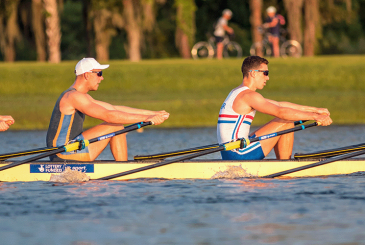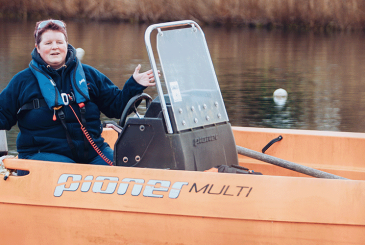Our Henley Royal Regatta Charitable Trust Coaches (HRRCT) work with schools to make rowing available to children who wouldn’t normally be able to access the sport. The partnership between British Rowing and the Henley Royal Regatta Stewards’ Charitable Trust is in its 20th year and the current projects are now in their second year, and it’s certainly been a challenging one so far!
In our last article to celebrate UK Coaching Week, Caroline Roberts talks to our HRRCT coaches – Ellie, Jess and Amy – about their coaching, their pre-pandemic achievements, and what they’ve been doing during lockdown.
Ellie Sadler began rowing aged 14, later coaching at Star Rowing Club in Bedford. She’s been doing outreach coaching in schools across Bedfordshire while studying for an MSc in forensic psychology.
Tell me about some of the highlights of your project
I’ve worked with some students who have learning or physical disabilities and we managed to get some adaptive equipment so they could go on the water. Even if they didn’t manage to row up and down the river, they got a feel for sitting in the boat and watching and listening to their blade in the water. They really loved it as it was different from normal PE lessons.
I’ve also worked with students from a referral unit, who don’t attend mainstream school. Rowing has given them an outlet and a few of them have really engaged with it. They were developing with every session and remembering what they’d learnt.
“Sport can be a massive focus for young people – and it can save them from going down the wrong path”
How’s lockdown been?
I’d organised a big indoor rowing event for all the schools and it had to be cancelled. That was really hard.
But one positive is that we [the HRRCT coaches] have got together online several times a week to plan, share ideas and keep each other updated on what we’re doing.
What does coaching mean to you?
Being involved in rowing has turned me into the person I am now, and I want to help others benefit too.
Sport can be a massive focus for young people – and it can save them from going down the wrong path.
I definitely want to carry on coaching for a few years before I start my career in forensic psychology.
Jess Harris rowed competitively at Newcastle University and began coaching the junior squad at Tyne ARC after being injured. She’s now based in Slough, where she works with schools across the borough while studying for an MSc in psychology though distance learning.
How have students responded to the project?
Some were a bit apprehensive at first as they’d never been exposed to rowing before. We were holding our sessions on Dorney Lake and used lots of games, such as collecting rubber ducks.
For me, it’s not just about the rowing, it’s about seeing them developing and becoming more confident.

We had one girl who forgot her PE kit every single session and didn’t want to join in. Then, after about four sessions, I overheard her say to another girl that she was going to bring her kit next time as it looked quite fun. Just overhearing that made me think we’re doing something right.
And she did bring her kit the next week.
“Through coaching, I’ve realised that I want to go into teaching eventually”
What’s happened during lockdown?
Dorney Lake’s been closed but, over the summer holiday, we’ve managed to get some of the more competent students out on the river for a few sessions at our local community club, Dorney Boat Club.
It was a bit of a challenge as they’re used to being on a lake with no one else about. We’ve also done some land-based training with the younger ones.
What have you learned from being an HRRCT coach?
Coaching at Tyne ARC, I’d see the same kids for years. But going into different schools I’ve had to learn how to develop that relationship really quickly, and how to be authoritative, but approachable, at the same time.
Through coaching, I’ve realised that I want to go into teaching eventually.
Amy McCarthy was a high-performance junior rower but moved into coaching after an injury. She is based in Sunderland and is now researching injury prevalence in adolescent rowers for her MA at Durham University.
Tell me a bit about your HRRCT project
It mostly involves running indoor rowing sessions in school – and supporting young people to attend river sessions. We’ve had a few schools come and use the tank at Durham University and that was a really good experience for them. Plus, we were able to show them the facilities and the boathouse.
It’s about opening their eyes to opportunities.

“You don’t have to have money to be able to row”
What have you focused on during lockdown?
It’s given me the chance to work on a training session for teachers to help them deliver rowing. Schools are trying to get to grips with everything and I don’t think we’re going to be able to get back to working with the students until January, but we might be able to work with small groups of teachers and make an impact that way.
How have you used your personal story to inspire students?
It’s been really rewarding to share my experiences. I’m not from a posh area and I went to a school 10 minutes down the road. You don’t have to have money to be able to row.
When I started rowing and was doing well, the school used the pupil premium to pay for my fees. I was told not to bother applying to a Russell Group university because I wouldn’t get in. But I did my first degree at Durham and I’m doing my MA there too.
How can we make rowing open to all?
One of the biggest challenges in getting students from lower-income backgrounds engaged in rowing is transport to the clubs, as they tend to be away from transport links. It would be good if small pots of funding were available for schools to use for external travel companies, buying second-hand minibuses, or upskilling more teachers to drive them.










